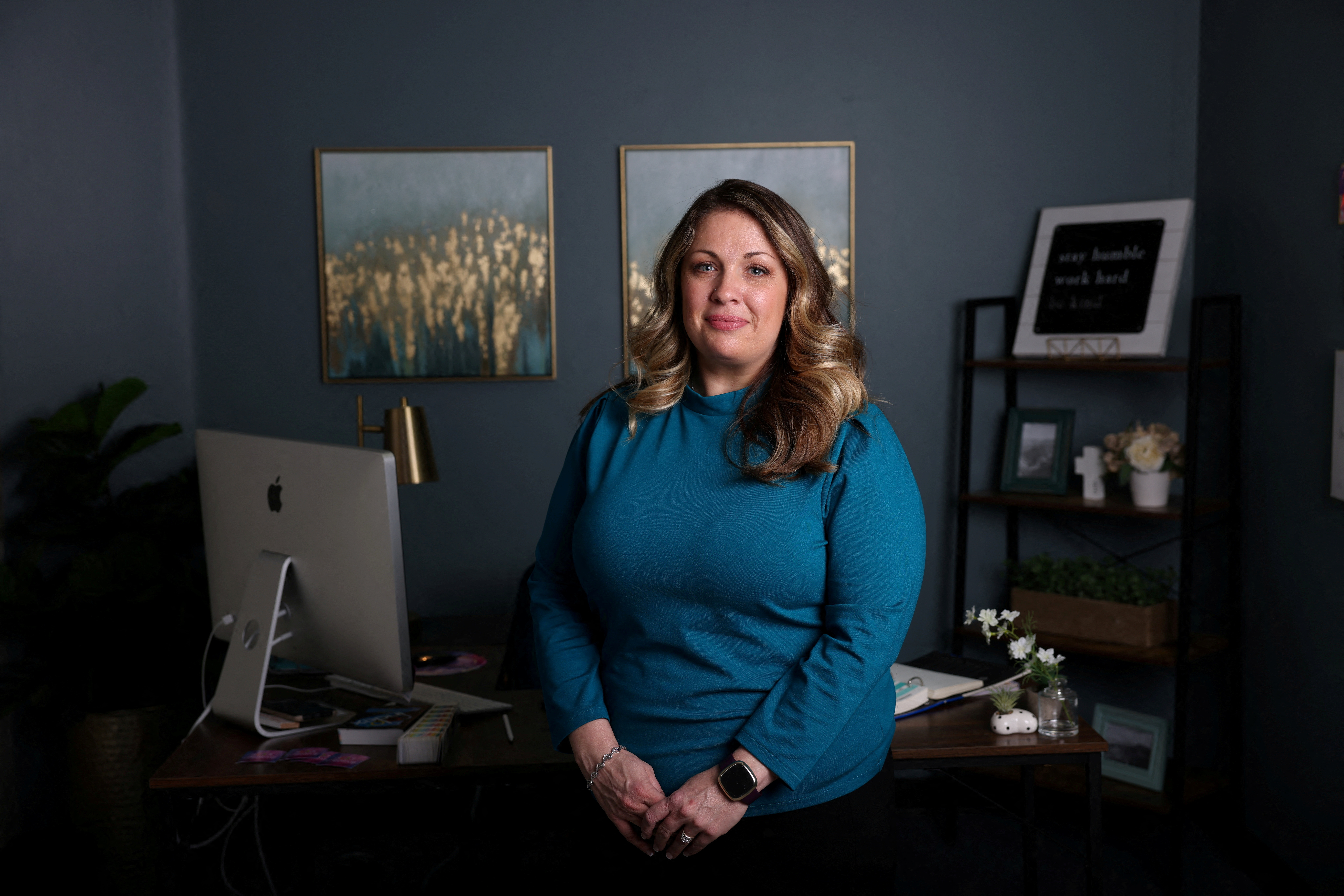U.S. Supreme Court hears arguments over anti-gay marriage web designer

[1/2] Web designer Lorie Smith, plaintiff in a Supreme Court case who objects to same-sex marriage, poses for a portrait at her office in Littleton, Colorado, U.S., November 28, 2022. REUTERS/Kevin Mohatt
WASHINGTON, Dec 5 (Reuters) - The U.S. Supreme Court on Monday began hearing arguments in a major case pitting LGBT rights against a claim that the constitutional right to free speech exempts artists from anti-discrimination laws in a dispute involving an evangelical Christian web designer who refuses to provide her services for same-sex marriages..."
Reporting by Andrew Chung in Washington and Nate Raymond in Boston; Editing by Will Dunham
READ MORE
Listen Live: Supreme Court Hears Arguments on Same-Sex Marriage and Faith Case
The justices could settle a First Amendment question they left open only a few years ago.
The Supreme Court is hearing arguments on Monday in a First Amendment battle pitting claims of religious freedom against laws prohibiting discrimination on the basis of sexual orientation.
A web designer in Colorado, Lorie Smith, said she was happy to create graphics and websites for anyone, including L.G.B.T.Q. people. But her Christian faith, she said, did not allow her to create messages celebrating same-sex marriages. A state law forbids this kind of discrimination.
Here’s what else you need to know:
The ruling could have enormous consequences. Ms. Smith’s supporters say a ruling for the state would allow the government to force all sorts of artists to state things at odds with their beliefs. Her opponents say a ruling in her favor would allow many businesses to refuse service to, say, Black people or Muslims based on odious but sincerely held convictions.
If the case sounds familiar, it is. The court ruled in a very similar one in 2018 involving a baker of wedding cakes in Colorado but did not settle the question of whether the First Amendment permits discrimination by businesses open to the public based on their owners’ religious convictions.
The court has shifted to the right since that 2018 decision and has been exceptionally receptive to claims of religious freedom.
The court might have to give guidance on what kinds of businesses are engaged in expression. In the 2018 case, the baker’s lawyer was closely questioned about where to draw the constitutional line, but her answers did not reveal a consistent principle.
Eric R. Olson, the solicitor general for Colorado, and Brian H. Fletcher, the principal deputy solicitor general for the United States, are defending Colorado’s anti-discrimination law in Monday’s case.
Mr. Olson, who was appointed in January 2019, had previously been a partner at Bartlit Beck, a corporate and trial law firm. He graduated from Oberlin College and the University of Michigan Law School, then completed several clerkships, including for Justice John Paul Stevens.
In August, when Mr. Olson filed the state’s merit brief in the case, he took note of its defense of “the right of all Coloradans to participate in the public marketplace as equals.”
“Being part of this team doing this important work is such a privilege for us all,” he wrote.
Mr. Fletcher will argue on behalf of the Justice Department, which is supporting Colorado as a friend of the court.
He joined the Biden administration last year as an adviser to Attorney General Merrick B. Garland, for whom he had clerked when Mr. Garland was a judge on the Court of Appeals for the District of Columbia Circuit. He later moved to the No. 2 position in the solicitor general’s office.
He also served in the solicitor general’s office as well as the White House Counsel’s office during the Obama administration. After moving to private practice, he worked in the Supreme Court practice of the law firm WilmerHale.
A debater in high school and college, Mr. Fletcher graduated from Yale University and Harvard Law School. He also clerked for Justice Ruth Bader Ginsburg.
During the Trump administration, Mr. Fletcher was a professor at Stanford Law School, where he helped direct a Supreme Court clinic. When he joined, his co-director, the prominent law professor Pamela S. Karlan, praised him as versatile.
“Baseball scouts talk about five-tool players, and Brian is the paradigmatic five-tool Supreme Court lawyer,” she said. “He writes powerfully and quickly, has great judgment, gives the students exactly the right combination of guidance and ownership, and is wonderfully supportive of his colleagues and staff as well.”

Dec. 5, 2022, 11:06 a.m. ET
Jeremy W. Peters
Justice Thomas presses the lawyer arguing against the web designer on the difference between businesses where free speech, or art, is the product, and more purely commercial enterprises like hotels. “This is not a hotel. This is not a restaurant. This is not a riverboat or a train,” the justice says, referring to website design.

Dec. 5, 2022, 11:06 a.m. ET
Charlie Savage
Eric R. Olson, the solicitor general for Colorado, is now arguing. He says the question should be framed through public accommodations laws, raising the analogy of whether a Christmas store could refuse to sell its products to Jewish customers. The plaintiffs are seeking a sweeping license to discriminate that could enable architects, photographers, etc., to refuse services to customers because of their views on disabilities, sexual orientation, religion or race.

Dec. 5, 2022, 11:01 a.m. ET
Ruth Graham
We’re getting an overview of American popular culture in this hearing. Justices and lawyers have so far referenced “It’s a Wonderful Life,” “Hamilton” and “The Wind Beneath My Wings,” among others.
Who are Eric Olson and Brian Fletcher, the lawyers defending the Colorado law?
Image




No comments:
Post a Comment